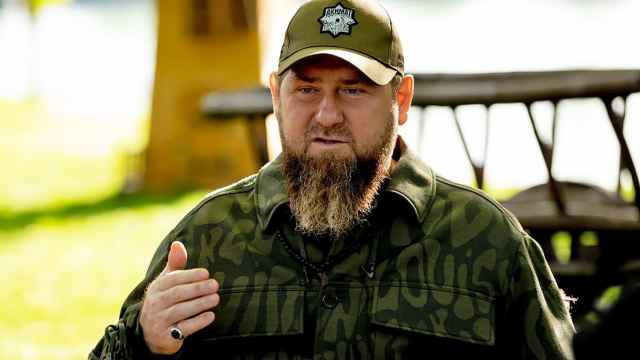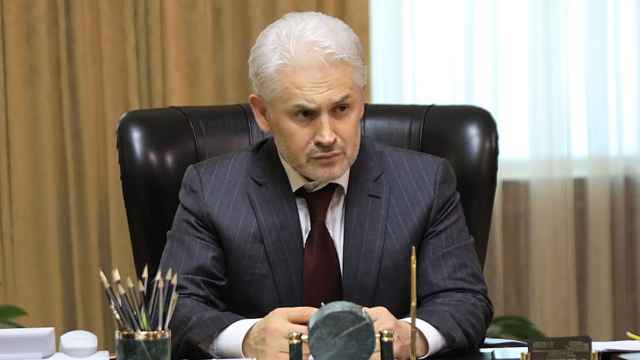The idea that Western media can spread Russian propaganda and enable the Kremlin’s information warfare about the situation in Ukraine has entered the mainstream. But some outlets have inadvertently bolstered Moscow’s propaganda by talking about Ramzan Kadyrov, the leader of the Russian administration in Chechnya as if he is the legitimate leader of an independent country without explaining the context. No media outlet would ever talk about the leaders of occupied Crimea or the Donetsk and Luhansk People’s Republics this way.
The “Chechen leader” is nothing but a Russian bureaucrat who lacks legitimacy and support among Chechens. He was put in charge of Moscow’s administration in Chechnya in 2007, during the second Russian-Chechen war, when Chechnya was already de facto under occupation.
The Kremlin first gave the title “President of the Chechen Republic of the Russian Federation” to Ramzan Kadyrov’s father, Akhmat Kadyrov, to reclaim the narrative to take control from the President of the independent Chechen Republic of Ichkeria, Aslan Mashadov.
By naming Kadyrov “president,” not a mere governor like in other territories, the Kremlin wanted to make its grip over Chechnya look more legitimate. It happened together with the Chechenization of the conflict during the Second Chechen War, in which Russians started to use ethnic Chechens to prosecute Chechen civilians. Kadyrov’s family was chosen to carry out this operation.
As for Ramzan Kadyrov, he was famous at the time not just because of his father and lack of charisma, but because of his mafia-style actions against ordinary Chechens.
In 2006, before Ramzan Kadyrov was picked to rule occupied Chechnya, Anna Politkovskaya said, “[Ramzan Kadyrov’s] personal control was expressed only in the fact that he ordered force, threats, and payment for this construction from other people, since it was not paid for from the federal budget.”
“The main source of income for Kadyrov’s budget is extortion from everyone who can be robbed,” she added.
Ali Bakaev is an official spokesperson for the Chechen Sheikh Mansur battalion that has been fighting on the Ukrainian side against the Russian army since 2014. I spoke with him about his own memories of the referendum on which Chechens voted to be part of Russia, which brought Akhmat Kadyrov’s administration to power:
“My parents were killed by Russians during the wars,” he told me. “My granny was barely able to save my little sisters and me. We were just children. But Russian militants blackmailed Granny. They forced her to go and vote for Chechnya to become a part of Russia. They threatened to kill us if she did not. Ramzan Kadyrov and his father weren't chosen by our people. You can’t make people vote or participate in any referendum by aiming at them with machine guns, like they did.”
This is how all elections for the Kremlin’s proxies in Chechnya happened. Chechen people were forced to choose both Akhmat and Ramzan Kadyrov during the war. Civilians were taken from the street to be publicly denounced as rebels to show that any signs of resistance toward Russian occupation were being cleaned up.
Experts have pointed out that nobody outside the Kremlin and its stooges in Chechnya believed the results were truly legitimate. In those years, Chechens faced punishment for actions as small as wrong glances toward Russian soldiers to careless words.
That has not changed. While all media in Russian-controlled Chechnya is controlled by the state, independent Chechen political channels such as NIYSO and 1Adat, and Tumso Abdurahmanov’s YouTube channel continue to spread stories about Chechen people kidnapped by the authorities, to be tortured, executed without any trial or illegally sent to the front line in Ukraine. Sometimes they are taken without any reason as part of a mass terror campaign to break the will of the Chechen population, sometimes as a punishment to their relatives in Europe who spoke up against the Chechen government.
From my own experience and that of my Chechen contacts, Kadyrov is deeply hated in all parts of Chechen society. I have spoken with Salafi, Sufi and atheist Chechens, with traditional wives and Chechen feminists, a former ISIS supporter and a Chechen gay activist, and people of all generations from villages to Grozny. The only thing these people have in common is their hatred of Kadyrov.
“Ramzan Kadyrov is no one to the Chechen people. He is uneducated and doesn’t have credibility,” Djambulat Suleimanov, a Chechen historian and leader of the Chechen liberation group United Force, explained. The organization's representatives in 11 different countries give him a unique insight into the diaspora.
“Ramzan Kadyrov is a collaborator. But people at home cannot speak about it because they are scared not just for their lives, but for the survival of their families. The ideas Ramzan Kadyrov has brought to Chechen society, the way he behaved, the slave mentality and the authoritarianism that he is spreading. All of this is alien to our culture. Chechens have never had lordship for centuries. We are proud of our liberty. But Kadyrov is trying to shut down anyone whose opinion is different from his own. We, Chechens, respect the elderly and protect the weak. But Kadyrov attacked them first. He used and manipulated Chechen tradition, for example, by excluding criminals from society and announcing blood feuds, twisting them to serve his political ends," he added.
"This is more harmful than the Soviets' repressions because they were at least seen as outsiders. Kadyrov is not seen as an outsider by people outside of Chechen culture, but influenced Chechen youth badly. His power is based on the Russian military and the Kremlin’s administration. He couldn’t survive one-on-one against the Chechen people.”
Chechen refugees in Europe and the U.S. are scared to speak out against Kadyrov for the same reason people back home refused to do it. They are scared for the lives of their family members and friends. This is the primary reason why the Chechen diaspora mostly stays away from the media and little information about the actual situation in the region gets out.
Meanwhile, the Western media, for some peculiar reason, speaks about Ramzan Kadyrov in a way Chechen people never would. Just because of the formal title that the Kremlin bestowed on Kadyrov, the Western media often call Kadyrov as a “strongman,” “warlord,” or the “leader” of Chechnya, and this is basically what the Kremlin wants to legitimize the occupational regime in Chechnya, and prove that Chechen people are not oppressed and have the opportunity to choose a leader among their own.
The same media have never spoken that way about the governors of the Russian region or about the Russian administration in the occupied Crimea and Donbas. The credibility Ramzan Kadyrov gets from this elevation above other Russian governors and governors of Russian-occupied territories makes him more influential. When the world sees him as an independent actor, his position and his confidence are boosted, and his will is presented as the will of the Chechen people, whose real opinion is erased.
Words matter. Multiple studies show that using different terminology for the same condition affects how doctors treat their patients, reinforcing biases both for people who used them and for whom they were used against.
This is why it is essential for the fight against Russian propaganda to stop legitimising the Russian Kadyrov regime. The first thing the Western world could do to stop the mass terror campaigns against Chechen civilians is to put Chechnya’s situation in its correct historical context.
A Message from The Moscow Times:
Dear readers,
We are facing unprecedented challenges. Russia's Prosecutor General's Office has designated The Moscow Times as an "undesirable" organization, criminalizing our work and putting our staff at risk of prosecution. This follows our earlier unjust labeling as a "foreign agent."
These actions are direct attempts to silence independent journalism in Russia. The authorities claim our work "discredits the decisions of the Russian leadership." We see things differently: we strive to provide accurate, unbiased reporting on Russia.
We, the journalists of The Moscow Times, refuse to be silenced. But to continue our work, we need your help.
Your support, no matter how small, makes a world of difference. If you can, please support us monthly starting from just $2. It's quick to set up, and every contribution makes a significant impact.
By supporting The Moscow Times, you're defending open, independent journalism in the face of repression. Thank you for standing with us.
Remind me later.






